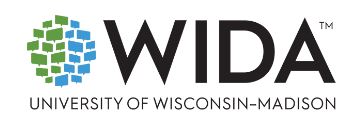Click the image below for the Number & Percentage of English Learners who Attained English Proficiency
English to Speakers of Other Languages (ESOL) is the state-funded language instruction educational program for eligible English learners (ELs) in grades K-12 in Georgia public schools (Georgia School Law Code 1981, §20-2-156, enacted in 1985). ESOL language instruction is focused on developing EL students’ academic English proficiency in each content area of the Georgia Standards of Excellence (GSE). The WIDA Consortium English Language Development (ELD) Standards aligned with the GSE guide the work of ESOL teachers. Differentiated instructional practices, both in ESOL and general education classes, ensure that the language development needs of Georgia’s EL students are met. In ESOL language programs it is appropriate, when practicable, to use the student’s home language as a means of facilitating instruction and providing limited English-proficient (LEP) parents with school-related information.
The goal of the ESOL language instruction educational program for EL students is to increase both English language proficiency (ELP) and academic language proficiency in content-area subject matter. Successful ESOL language programs focus on collaboration and shared accountability for the success of all EL students.
For information about the federal programs that supplement the ESOL Language Program please visit the Title III, Part A webpage.
Framework for EL Programs: Georgia's Systems of Continuous Improvement
Georgia’s System of Continuous Improvement frames the work of EL Language Programs. Daily English language instruction for EL students takes place within a Coherent Instruction System. Professionally qualified ESOL teachers and school leaders teach and assess EL students as part of the Effective Leadership and Professional Capacity Systems. Schools reach out to engage EL parents and their families within the Parent & Family Engagement System, and EL students are provided with wrap-around services within the Supporting Learning Environment of schools.
WIDA Consortium
Since 2006 Georgia has been part of the WIDA Consortium, a group now consisting of 41 member states. Together with our colleague-states, we work in close collaboration with the Wisconsin Center for Education Research (WCER), the Center for Applied Linguistics and Data Recognition Corporation (DRC) to ensure that our English Language Proficiency assessment (WIDA ACCESS) and our ESOL teaching standards remain reliable and valid across administration years. Click on the WIDA link below to learn more about our consortium’s K-12 English Language Development (ELD) Standards and the assessments used with ELs (WIDA screeners and the end-of-year WIDA ACCESS).
WIDA ELP Screeners and Assessments


